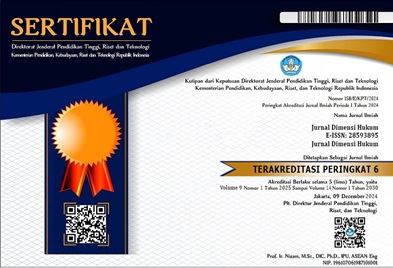EVALUASI KINERJA PENGADILAN TINDAK PIDANA KORUPSI PADA PENGADILAN NEGERI PEKANBARU
Kata Kunci:
Pengadilan Khusus-Korupsi-Komisi Pemberantasan Tindak Pidana KorupsiAbstrak
Initially, the Corruption Court was established based on Law No. 30 of 2002 concerning the Corruption Eradication Commission. As a special court, the Corruption Court is under the District Court (PN), in this case the Central Jakarta District Court. In its development, the existence of the Corruption Court has undergone changes. In accordance with the decision of the Constitutional Court (MK) Number 012-016-019 / PUU-IV / 2006 dated December 19, 2006, the Corruption Court must be established with a separate Law, no later than three years after the issuance of the MK decision. Based on Article 3 of Law No. 46 of 2009, the Corruption Court is domiciled in each district / city capital whose jurisdiction covers the jurisdiction of the relevant district court. The Corruption Court faces several obstacles in eradicating corruption at the Pekanbaru District Court, so that special efforts are needed to overcome these obstacles. The obstacles faced by the Corruption Crime Court in Eradicating Corruption at the Pekanbaru District Court are the Limited Facilities and Infrastructure Factors, the Lack of Judges, the Defendant Being Guarded by Mass Organizations, and the Public's Distrust Factor.This study uses a sociological legal research approach. Sociological legal research emphasizes that law, as a social institution, is always linked to other social variables. The research location chosen was the Pekanbaru District Court. The author chose this location due to his interest in evaluating the performance of the corruption court at the Pekanbaru District Court.The results of this thesis research show several main problems that can be concluded. First, There is still a need for efforts to improve the competence of corruption judges in understanding corruption through various refreshments, such as further studies, participating in various academic activities that support the profession, and the availability of various literature that supports performance in the court library, and the excessive workload for corruption judges has the potential to be a factor causing the birth of poor quality decisions and tends to prioritize formalities Source. Second, Efforts made to improve the effectiveness of the performance of the Corruption Court in eradicating corruption at the Pekanbaru District Court include the existence of a special day for corruption, acceptance of prospective ad hoc judges for corruption, the existence of recording of corruption trials, escorting trials by police officers and also witnesses being confronted with other witnesses related to.
Pada awalnya, Pengadilan Tipikor dibentuk berdasarkan Undang-Undang No. 30 Tahun 2002 tentang Komisi Pemberantasan Korupsi. Sebagai sebuah pengadilan khusus, Pengadilan Tipikor berinduk pada Pengadilan Negeri (PN) dalam hal ini PN Jakarta Pusat. Pada perkembangannya, keberadaan Pengadilan Tipikor mengalami perubahan Sesuai putusan Mahkamah Konstitusi (MK) Nomor 012-016-019/PUU-IV/2006 tanggal 19 Desember 2006, Pengadilan Tipikor harus dibentuk dengan Undang-Undang tersendiri, paling lambat tiga tahun sejak dikeluarkannya putusan MK. Berdasarkan Pasal 3 UU No. 46 Tahun 2009 Pengadilan Tindak Pidana Korupsi berkedudukan di setiap ibukota kabupaten/kota yang daerah hukumnya meliputi daerah hukum pengadilan negeri yang bersangkutan. Peradilan Tindak Pidana Korupsi menghadapi beberapa kendala dalam pemberantasan korupsi di Pengadilan Negeri Pekanbaru, sehingga diperlukan adanya upaya khusus dalam mengatasi kendala-kendala yang di hadapi tersebut. Adapun kendala kendala yang dihadapi Pengadilan Tindak Pidana Korupsi dalam Pemberantasan Korupsi di Pengadilan negeri Pekanbaru yaitu Faktor Terbatasnya Sarana dan Pra Sarana, Faktor Kurangnya Personel Hakim, Faktor Terdakwa Dikawal Oleh Organisasi Masa, dan Faktor Pandangan ketidakpercayaan Masyarakat.Penelitian ini menggunakan jenis penelitian hukum solsiologis. Penelitian hukum sosiologis yaitu bahwa hukum sebagai pranata sosial selalu terkait dengan variabel-variabel sosial lainnya. Lokasi penelitian yang dipilih adalah Pengadilan Negeri Pekanbaru. Alasan penulis memilih lokasi tersebut karena ketertarikan penulis terhadap evaluasi kinerja pengadilan tindak pidana korupsi pada pengadilan negeri pekanbaru.Hasil penelitian dari skripsi ini terdapat beberapa masalah pokok yang dapat disimpulkan. Pertama, Masih perlunya upaya untuk meningkatkan kompetensi hakim tindak pidana korupsi dalam memahami tindak pidana korupsi sebagai melalui berbagai penyegaran pemahaman, seperti studi lanjut, mengikuti berbagai kegiatan akademik yang menunjang profesi, dan ketersediaan berbagai literatur yang menunjang kinerja di perpustakaan pengadilan, dan beban kerja yang terlalu tinggi bagi hakim tindak pidana korupsi sangat berpotensi menjadi faktor penyebab lahirnya putusan yang tidak bermutu dan cenderung mementingkan formalitas Sumber. Kedua, Upaya yang dilakukan dalam meningkatkan efektivitas kinerja Pengadilan Tindak Pidana Korupsi dalam pemberantasan korupsi di Pengadilan Negeri Pekanbaru berupa Adanya hari khusus tindak pidana korupsi, penerimaan calon hakim ad hoc tindak pidana korupsi, Adanya perekaman sidang tindak pidana korupsi, Pengawalan persidangan oleh aparat Kepolisian dan juga Saksi dikonfrontir dengan saksi lainnya yang berkaitan.





